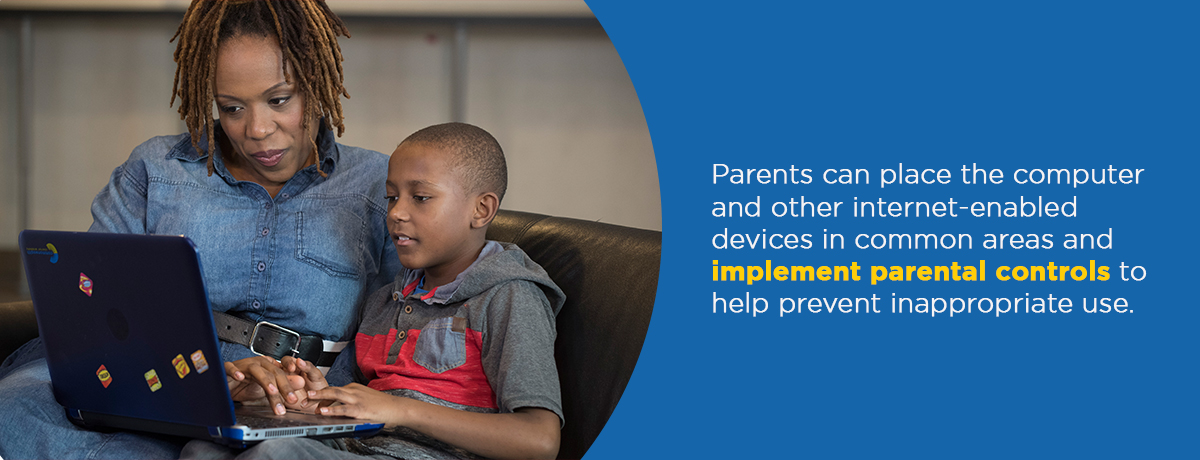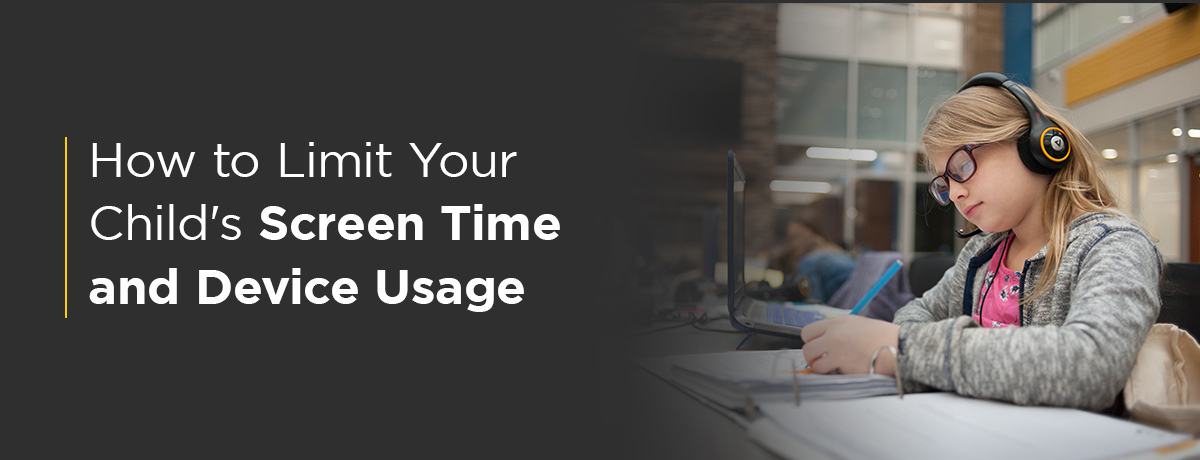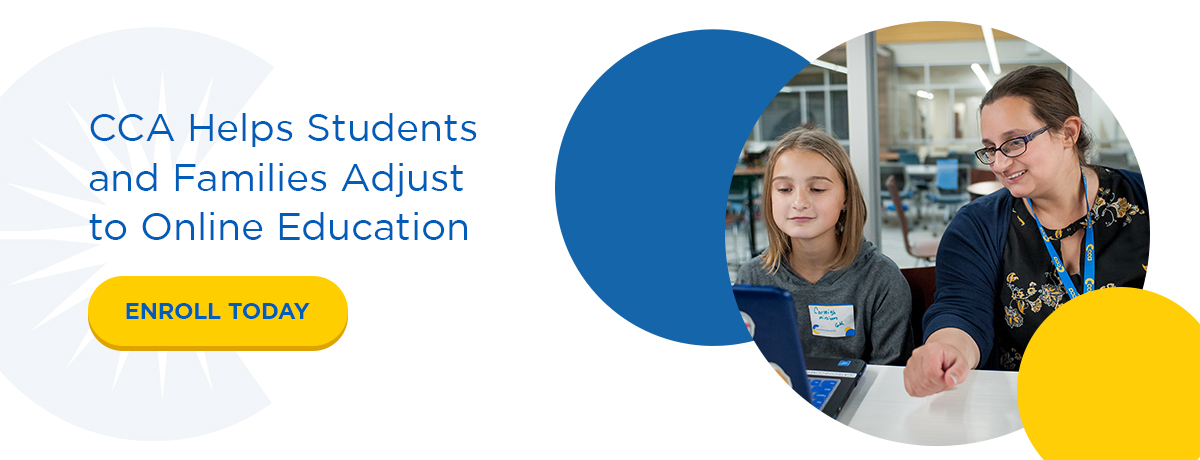Technology offers groundbreaking ways for children to interact and learn, all according to each one’s unique needs. It’s how we deliver customized cyberlearning at CCA.
Still, the internet age has its pitfalls. Most parents worry that their kids spend too much time in front of screens. The COVID-19 pandemic triggered a rise in internet usage among teens and kids of all ages — 62% of American parents said their teens’ screen time increased by four extra hours during the pandemic.
The good news is that parents can learn to limit screen time for kids. At CCA, we prioritize delivering the best of the digital age through personalized learning and offering the right parental control tips to protect our students from the distractions and dangers of the internet.
The Negative Effects of Social Screen Time
American teens spend an average of seven hours and 22 minutes a day on entertainment screen media, and children ages eight to 12 spend four to six hours. The following negative effects show why families need screen time rules for kids.
1. Physical Inactivity and Strain
- Eye strain: Your child’s eyes are a powerful tool for learning. Excess screen time can cause eye fatigue, blurry vision, and dry eyes.
- Psychological effects: One study found that teens who spend more than seven hours a day on screen time are twice as likely as those who spend one hour to be diagnosed with anxiety or depression.
- Inactivity: The American Psychological Association notes that two hours or more a day of sedentary viewing can trigger consequences in health and well-being, like obesity and high blood pressure. Screen time takes away from physical activities that make children stronger, more energetic, and more self-assured.
2. Emotional Development
Internet use can restrict the bonding time between parents and their kids. Plus, studies show that screen time makes children less capable of recognizing emotions and reading social cues, impairing their ability to build healthy friendships and build self-esteem.
Screen usage can become a problem when kids exhibit signs of addiction-like attachment to their devices. If you are concerned about your child’s use of social screen time, have open conversations with them, determine other activities they can enjoy doing, and set ground rules for phone time.
3. Online Safety
Cybercriminals know children are especially susceptible to clicking links that look legitimate or entering a parent’s credit card number to get access to a new video game. Children spending too much time on digital media can also be more vulnerable to inappropriate material.
4. Inability to Focus During School
Screen time can harm kids’ academic performance by fracturing their focus into several directions:
- Too much screen time detracts from other responsibilities like completing assignments.
- Lack of sleep from excessive exposure to a phone’s blue light makes children unmotivated and tired.
Tips for Managing Electronic Device Usage at Home
Try these parenting tips for managing your child’s phone and making screen time fun, productive and safe.
- Set screen-time limits outside school: Phone time isn’t harmful by itself, but parents can strike the right balance by prioritizing education and information. How much screen time for kids is enough? The secret to safe screen time management is ensuring that out-of-school screen time doesn’t interfere with sleeping, eating, schoolwork, physical activity, and interaction with family and friends.
- Keep the computer in a shared space: Parental monitoring is crucial in internet safety. Put the computer in a common area where you can keep an eye on your children’s internet travels.
- Teach your children about online safety: In age-appropriate language, explain that some people will pretend to be nice to gain their trust. Teach them that if a conversation makes them uncomfortable, they should contact a trusted adult. Also, explain the dangers of clicking on unsolicited links, even if they look reputable.
- Use parental controls when necessary: Parental monitoring prevents children from stumbling into the dark alleys of the World Wide Web. The wide range of available parental control software, whether free or paid, allows families to choose services that suit their operating systems, needs, and budgets.
- Plan more family activities: Set aside time once a week to enjoy family time together away from devices. Fun activities include a family board game or movie night, taking a picnic or walk, cooking a meal together, and creating artwork or crafts.

Tips for Managing the Tech Habits of Online Students
Consider these parenting tips about how to limit screen time for your child and maintain control of your family’s digital media use.
1. Watch Your Child’s Behavior
As children explore new subjects, the internet offers unlimited information — but can direct them toward inappropriate or unsafe content. Parents can place the computer and other internet-enabled devices in common areas and implement parental controls to help prevent inappropriate use. Conversations about the dangers of the internet help build your child’s digital literacy.
2. Minimize Distractions
During a long school day, kids might feel the temptation to click over to a fun video game, but they should learn to distinguish between screen time for learning and screen time for fun. The cellphone or tablet probably is not a cyber school student’s educational necessity.
A great way to limit screen time on your child’s smartphone is to establish a family policy that all nonessential electronics are turned in every morning and returned after the school day ends. If you are expecting important calls, place cellphones within hearing distance but out of reach. Parental-control software can block inappropriate websites during school hours and are a great way to set screen time limits too.
3. Allow Music if It Helps
Music has a positive effect on studying, memory and concentration. If it falls within your house rules and your child wants to listen to music during study time, it can be a benefit. Make sure the music isn’t distracting or a music video that your learner is watching.
4. Create an Effective Workspace
Workspaces will look different based on each learner’s needs and the available space in the home. Whether it is a room devoted to schoolwork, a desk in the corner of a family living area, or part of the dining room table, all effective workspaces have things in common.
- Free of clutter: Remove all distractions such as toys, unnecessary electronics, and items that aren’t essential in the workspace.
- Stocked with all materials to complete written work and projects: These can include the technology for your student to do schoolwork, such as laptop or desktop computer, and printer, plus pens, pencils, notebook paper, calculator, and scissors.
- Organized: Disorganization causes stress and sets a negative tone for the rest of the school day. Consider using a bookshelf with one subject and corresponding supplies on each shelf, or a drawer or bin system in the same way.
- Inspiring: Does the workspace inspire learning? Artwork, educational posters, natural light, and neutral pastels help create a fresh, inspiring workspace.
Balancing Your Kids’ Electronic Usage Throughout the Day
In the 21st century, device usage drives much of a child’s day. For cyber school families, screen time is a vital element of academic progress and personal growth.
Of course, the games, videos, and social interaction don’t stop at the end of the school day, which is why parents and guardians should consider the pros and cons of electronics usage. Too much media, and the wrong type, can undermine your child’s health and well-being. Careful consideration and frank discussions about a family media plan help achieve balance that promotes a healthy home environment.
CCA Helps Students and Families Adjust to Online Education
While too much screen time can have adverse effects, some screen time can also unlock your child’s creativity and lead to new learning opportunities that can lead to better thinking skills. At CCA, we make online learning productive, engaging and safe for all learners. We offer personalized, flexible education that encourages your child to explore a world of knowledge and interests. Our approach leverages the advantages of online learning while ensuring that your family gets the services and supports to make the transition with ease.
Learn more about how CCA brings a rich, rigorous online education to the safety of your home.










